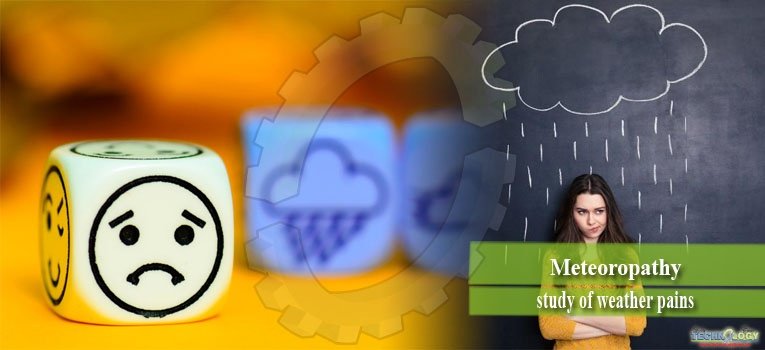Meteoropathy refers to occurrence of various symptoms and reactions in our body as a result of weather changes. There are a lot of weather related factors that affects our body e.g. temperature, UV rays, humidity, wind, air pressure, rain, thunder and ionization effect.

Most affected are people in their middle ages, especially women, but anyone can be affected from babies to elderly people. The term meteoropathy is derived from Greek words ‘meteora’ (things high in the air or celestial phenomena) and ‘pathos’ (illness, suffering and pain). Meteora refers to temperature, humidity, barometric pressure etc. One who suffers from meteoropathy is referred as a meteoropathic.
The relationship between changes in weather and pain has been perceived since the classical Roman age. Hippocrates was the first to note in his book “Airs, waters and places”, in about 400 B.C.;
“Whoever wishes to investigate medicine properly, should proceed thus: in the first place to consider the seasons of the year, and what effects each of them produces for they are not at all alike, but differ much from themselves in regard to their changes. Then the winds, the hot and the cold, especially such as are common to all countries, and then such as are peculiar to each locality. We must also consider the qualities of the waters, for as they differ from one another in taste and weight, so also do they differ much in their qualities…”
Symptoms of Meteoropathy
The symptoms of meteoropathy can occur 24 – 48 hours before weather change. They are especially prevalent in sensitive people. The most common symptoms are as follows;
- Depression
- Headaches
- Dizziness
- Physical weakness
- Hypertension
- Increased sensitivity to pain in joints and muscles
- Worsening the symptoms of existing diseases
- Mood changes
- Tension
- Increased heart beat
These symptoms mostly lasts for day or two and then the body gets to stabilize with the changing weather. Symptoms are the same despite the age of a person.
Types of meteoropathy:
Meteoropathy can either be primary or secondary.
- Primary or basic meteoropathy affects healthy people. It occurs in the form of mood changes, body weakness and difficulty in sleep or pain during weather change.
- Secondary meteoropathy occurs when existing illness is being deteriorated due to weather changes. It may results in elevation of high blood pressure, heart and lung diseases, inflammatory and degenerative disease of muscular-skeletal-joints system.
Meteoropathy is especially dangerous for people who already have serious health problems because it can even lead to death.
Causes of Meteoropathy
Changes in weather are accompanied with change in electromagnetic waves. They in return affect hypothalamus in the brain. It results in increase excretion of stress hormones as well as decrease in the hormone of happiness like endorphin. It leads to increased anxiety, irritation, headache and other similar symptoms.
High atmospheric pressure narrows blood vessels leading to high blood pressure, while low atmospheric pressure causes low blood pressure. Similarly changing weather conditions also effects joints and bones and causes intense pain. It is also deliberated that one of the causes of meteoropathy is human alienation from nature.

Prevention of meteoropathy Symptoms
In order to prevent discomfort because of meteoropathy, keeping an eye on weather forecast can help. Following are some of the tips that can help in prevention of meteoropathy symptom;
- Use of herbal teas and food supplements are really effective in comforting nerves and muscles during high humid climate.
- Use of lime reduces nervous irritability and tension.
- Physical activity and exercise increases nerve elasticity and makes them more resistant to climate fluctuations and changes in weather.
- Daily use of few drops of lavender oil clears the head and helps in insomnia.
- In case of heavy fog and high humidity, people facing chronic illnesses, especially asthmatics might especially experience health difficulties. This can be prevented by staying in warm inside and drinking teas from angelica. This encourages better blood circulation.
- Getting too much warmed up in cold weather slows down the circulation. Therefore the indoor temperature should be kept at about 20 degrees. Besides intense headaches, high indoor temperature can also weakens immune system, because mucous membranes are far more susceptible to infections in warm and it responds poorly to the large temperature difference of indoors and outdoors.
Conclusion
You might have observes that some people feel tired when weather changes but still can’t sleep, some people get nervous when winds become strong, or some people may feel sad and depressed when it rains. This is because their ability to function properly depends greatly on weather. This effect of change in weather on the behavior and health of humans is referred as meteoropathy. According to the recent research the number of people getting affected by weather changes is growing therefore incorporating the weather conditions in health in indispensable.